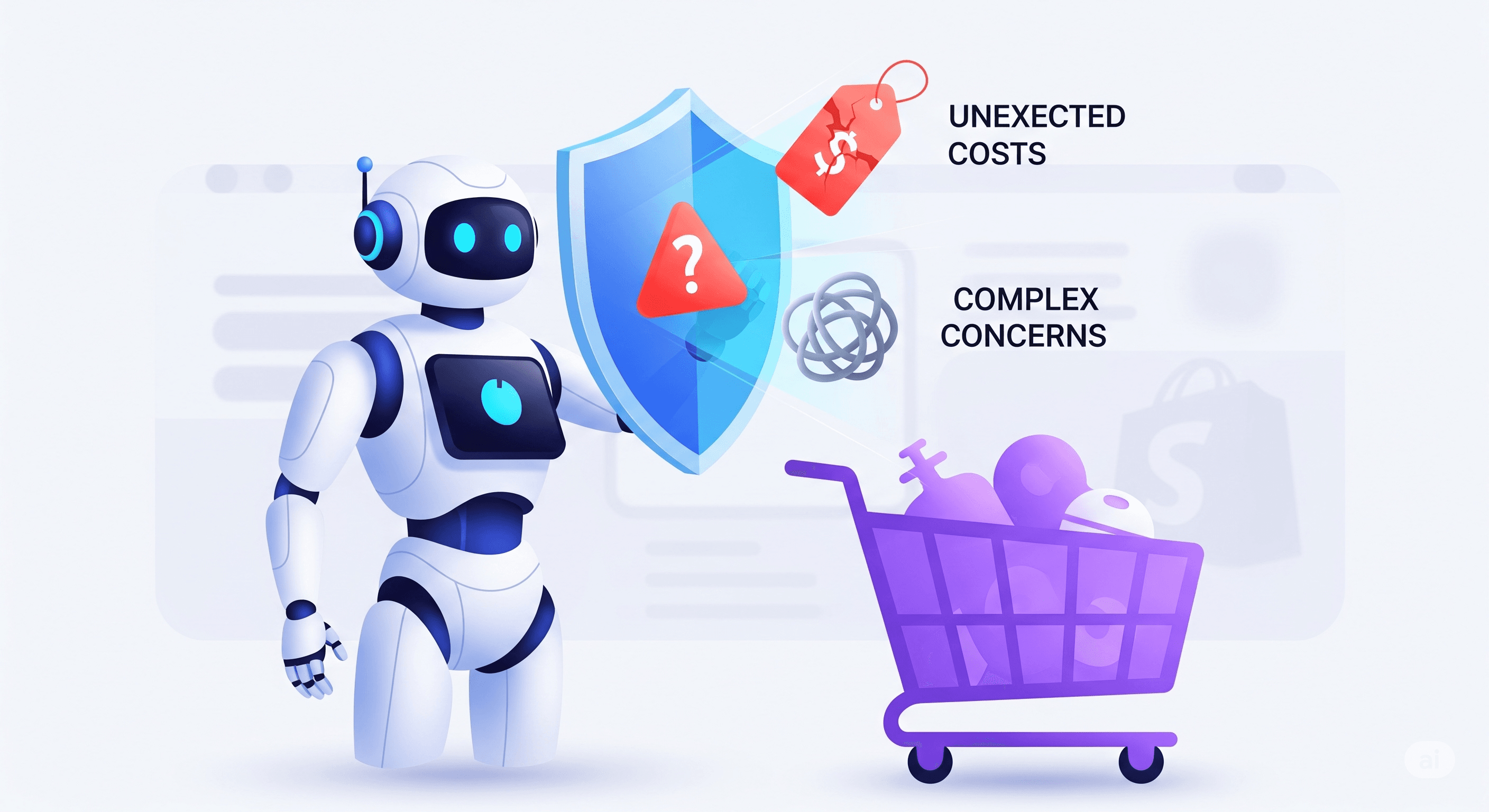Saturday, 19 Jul 2025
|Reduce Shopify Cart Abandonment with AI: A 5-Step Playbook

The $18 Billion Problem: A 5-Step Playbook to Slash Your Shopify Cart Abandonment Rate with an AI Agent
Introduction: The Silent Revenue Leak in Your Shopify Store
Did you know that for every 10 customers who add a product to their cart on your store, seven will leave without paying? This phenomenon, known as cart abandonment, is one of the most persistent and costly challenges in e-commerce. It represents a silent leak that drains potential revenue from businesses every second of every day, costing the industry an estimated $18 billion in lost sales every year. For many Shopify merchants, the average cart abandonment rate of approximately 70% is a frustrating, yet accepted, cost of doing business. But what if this acceptance is based on a fundamental misunderstanding of the problem?
Cart abandonment is not merely a passive event or a simple statistic. It is an active decision made by a customer at the most critical moment of their journey. It represents a failure—not of the customer's intent, but of the store's ability to maintain trust and communication when it matters most. The reasons customers abandon carts are not random; they are symptoms of a deeper issue that can be described as a "trust deficit." When a customer reaches the checkout, they are evaluating more than just the product; they are evaluating the brand's reliability, transparency, and respect for their time and security. A transactional relationship, built on a simple product-for-price exchange, is incredibly fragile. Any unexpected friction can shatter it. However, a relationship fortified by trust is far more resilient. A customer who trusts a brand is more willing to navigate the final steps of a purchase. Therefore, tackling cart abandonment requires more than just a reactive email reminder; it demands a proactive strategy to build and repair trust in real-time. This playbook introduces a new paradigm, one where an AI-powered "Checkout Guardian" stands watch, ready to transform moments of friction into opportunities for conversion.
The Anatomy of an Abandoned Cart: Why 70% of Your Customers Walk Away
To effectively solve the cart abandonment puzzle, it is essential to first diagnose its root causes. The "trust deficit" that drives customers away manifests in three distinct, yet interconnected, points of friction. By understanding the psychology behind each of these moments, merchants can move from simply observing the problem to actively solving it.
The Sticker Shock: Unexpected Costs (48% of Users)
The single largest driver of cart abandonment is the sudden appearance of unexpected costs at checkout, cited by 48% of users. A customer has gone through the entire process of browsing, selecting a product, and mentally committing to a purchase price. When they proceed to checkout and are confronted with high shipping fees, taxes, or other surcharges they weren't prepared for, it creates a powerful sense of negative surprise. This "sticker shock" does more than just break their mental budget; it fundamentally erodes trust. The interaction can feel deceptive, like a bait-and-switch, causing the customer to question the brand's transparency and fairness. At this moment, the carefully constructed value proposition of the product collapses under the weight of unforeseen expenses, and the easiest path forward for the customer is to simply close the tab.
The Labyrinth: A Complicated Process (17%) & Mandatory Accounts (24%)
Combined, a complicated checkout process (17%) and the requirement to create an account (24%) represent a massive source of friction rooted in a lack of respect for the customer's time and effort. In the digital age, consumers expect seamless, efficient experiences. Every additional form field, every password requirement, and every unnecessary step in the checkout flow is another opportunity for a motivated buyer to become a frustrated user. When a customer is ready to hand over their money, forcing them to create an account and remember yet another password can feel like an unreasonable demand. This friction is particularly damaging because it occurs at the final stage of the journey, turning what should be a moment of satisfaction into a tedious chore. The customer's motivation wanes with each click, and the perceived effort begins to outweigh the desire for the product.
The Trust Test: Security & Credibility Concerns (18%)
For 18% of users, the decision to abandon a cart comes down to a direct test of trust: security. Handing over credit card information online requires a significant leap of faith, especially with a brand the customer may be interacting with for the first time. A checkout page that lacks professional design, clear security badges (like SSL certificates), or a polished feel can raise immediate red flags. This is the ultimate manifestation of the "trust deficit." Without strong, visible signals of legitimacy and security, customers will hesitate. They will question whether their sensitive financial data will be protected, and the fear of potential fraud or data breaches becomes a powerful deterrent that overrides their desire to complete the purchase.
For years, the standard playbook for addressing these issues has been the delayed cart recovery email. However, this approach is fundamentally flawed. Sending a message hours or even days after the customer has left is akin to a store clerk chasing a shopper down the street long after they have decided to go elsewhere. It fails to address the real-time friction—the confusion over shipping, the frustration with the form, the flicker of security doubt—that caused the abandonment in the first place. At the point of checkout, the traditional lines between sales and support dissolve. A question about a return policy is not a support ticket; it is a final sales objection. A concern about shipping time is a barrier to conversion. To be effective, a solution must operate within this converged reality, capable of handling both support queries and sales incentives within a single, seamless, real-time interaction.
The Revenue Recovery Playbook: A 5-Step Guide to Proactive Conversion
Instead of reactively chasing lost sales, a modern strategy focuses on proactively preventing abandonment before it happens. The Debales AI Chatbot functions as a "Checkout Guardian," deploying a five-step playbook designed to address each point of friction directly, turning moments of doubt into confirmed sales.
Step 1: Neutralize Sticker Shock with Proactive, Intelligent Offers
The primary reason for abandonment—unexpected costs—can be neutralized with intelligent, real-time intervention. The Debales AI agent leverages Behavioral AI Enhancements to monitor user activity on the checkout page. It doesn't just sit passively; it actively looks for signs of abandonment, such as exit-intent (when a user's mouse moves towards the close button or back button) or extended idle time.
When the AI detects this high-risk behavior, it can trigger an Automated Response that proactively presents a solution. Instead of letting the customer leave, the chatbot can instantly pop up with a targeted offer, such as a free shipping code or a small, strategic discount to offset the extra costs. This capability is powered by its direct integration with Shopify, allowing it to view and sync active discount codes. This single action transforms a moment of negative surprise and potential brand damage into a positive, delightful experience. The customer feels seen and valued, and the brand turns a near-certain loss into a recovered sale.
Step 2: Eradicate Confusion with Instant, 24/7 Support
Last-minute questions about shipping, returns, or product details are a major source of checkout friction. If a customer has to leave the checkout page to find an FAQ or a policy page, the chances of them returning to complete the purchase drop significantly. Debales provides Instant Customer AI Support to eliminate this risk.
The AI is trained on your specific store data, including product information, shipping policies, and return procedures. When a customer has a question, they can get an accurate, immediate answer directly within the chat widget using Quick Replies, without ever breaking their purchase flow. This 24/7 availability ensures that no sale is lost due to an unanswered question, regardless of the time of day or the location of the customer. By providing this level of instant, automated support, merchants can not only reduce abandonment but also significantly lighten the load on their human support teams, allowing them to scale customer support without hiring more agents.
Step 3: Fortify Trust with Enterprise-Grade Security and Branding
To address the 18% of users who abandon carts due to security concerns, building immediate trust is paramount. The Debales platform is built on a foundation of enterprise-grade security, providing tangible trust signals to customers. These include USA-located AI servers for data protection, SOC 2-compliant security architecture, and end-to-end encryption to safeguard all interactions. Furthermore, the inclusion of a built-in reCAPTCHA element helps protect the store from spam and abuse, reinforcing the legitimacy of the platform.
Trust is also built through professionalism and brand consistency. Debales allows merchants to fully customize the chatbot's look and voice to match their brand. A chatbot that seamlessly integrates with the store's design, colors, and tone of voice feels like a native part of the experience, not a generic, third-party add-on. This professional presentation signals to the customer that the brand has invested in a high-quality user experience, making them feel more secure and confident in their decision to purchase.
Step 4: Evolve from a Chatbot to a True AI Sales Agent
A truly effective Checkout Guardian doesn't just save sales; it actively increases their value. Debales transcends the limitations of a simple chatbot by functioning as a sophisticated AI Sales Agent, leveraging the power of Conversational Commerce to drive revenue. While a basic bot waits for keywords, the Debales agent understands context and intent, allowing it to act like a top-performing in-store salesperson.
It can provide personalized product recommendations based on the items already in the customer's cart, suggest frequently bought together items, and execute strategic cart and checkout upsells. This transforms the checkout from a simple, passive transaction into a final, value-added consultation. By proactively engaging the customer with relevant suggestions, the AI agent can significantly increase the Average Order Value (AOV), turning a standard purchase into a more profitable one. This advanced capability is what separates a true AI agent from simpler tools. While Shopify's native tools help you
build a store, Debales helps you sell from it. Unlike basic chat tools like
(https://debales.ai/blog/tidio-vs-debales-ai), which focus on simple flows, Debales is designed for revenue generation. This ensures you
own the sale directly on your site, controlling the customer journey from start to finish.
Step 5: Unify the Entire Customer Journey
Customer interactions are no longer confined to a single channel. A modern commerce strategy requires a unified experience across every touchpoint. Debales is built for this omnichannel world, with deep integrations that connect your on-site chat with Email, Messenger, Instagram, and WhatsApp. This creates a seamless, persistent conversation with your customers, regardless of where it begins or ends.
An AI Email Agent can handle post-purchase inquiries, while the on-site AI Sales Agent manages pre-purchase questions and checkout recovery. This unified approach stands in stark contrast to traditional helpdesk systems. While platforms like Gorgias are designed to help human agents organize tickets, Debales is designed to resolve them autonomously, often before they are even created. Similarly, while a tool like
Zowie acts as a "support booster" for an existing helpdesk, Debales can function as the entire intelligent, automated system, handling both sales and support workflows end-to-end.
The Proof is in the Performance: Real Results for Shopify Merchants
The effectiveness of this 5-step playbook is not theoretical; it is demonstrated through tangible, data-driven results and the experiences of real Shopify merchants. The Debales AI agent has been shown to boost conversions by 21%, raise average order value by 41%, and recover 29% of abandoned carts. These figures align with broader industry findings that show predictive AI can cut cart abandonment by 18% and comprehensive checkout optimization can boost conversions by over 35%.
This impact is echoed in the feedback from store owners who have implemented the Debales AI Checkout Guardian. One merchant from DoorbellMount.Com in the United States noted the platform's ability to learn and adapt, stating, "They customized my solution and work with me to make sure the Chat works correctly. The AI chats learned my store and answer questions effectively". This highlights the agent's capacity to become a true expert on the business it serves.
Another store owner from IMEMYSELFGLOBAL in India praised its role in consultative selling: "Great app for converting my normal buyers into informed buyers and excellent customer service". Perhaps the most direct testament to its ROI comes from another U.S. merchant, who reported, "This is amazing. acts as a Salesperson on my website. and it actually works.... Drove HUGE results for my business". The team at Blossom and Rhyme confirmed the direct impact on the core problem, stating, "Since integrating it, we've seen higher sales, reduced cart abandonment, and improved engagement".
Conclusion: Turn Your Biggest Leak into Your Strongest Asset
Cart abandonment is more than just a line item in an analytics report; it is a direct signal of a "trust deficit" at the most crucial point of the customer journey. For too long, the standard response has been a delayed, reactive email that fails to address the underlying causes of friction—sticker shock, complexity, and security concerns. This approach leaves billions of dollars on the table and does little to enhance the customer relationship.
The Debales AI Chatbot offers a fundamental paradigm shift. It is not another passive tool but a strategic asset—a 24/7 "Checkout Guardian" that stands watch over your revenue. By proactively engaging customers, answering questions in real-time, neutralizing cost objections with intelligent offers, and building trust through a secure and professional interface, it transforms your biggest revenue leak into one of your strongest conversion assets. It doesn't just recover lost sales; it actively increases their value through intelligent upselling and cross-selling, turning every checkout into an opportunity for growth. It is time to stop accepting cart abandonment as an unavoidable cost and start seeing it as a solvable problem.
Ready to stop losing sales at the last second? Install the Debales AI Chatbot and activate your 24/7 Checkout Guardian in under 5 minutes. (https://apps.shopify.com/debales-ai-chatbot).
Want to see how a custom-trained AI Agent can transform your entire sales and support workflow? (https://debales.ai/book-demo).
All blog posts
View All →
Monday, 27 Oct 2025
Predictive Maintenance at Scale: Cut Fleet Downtime 40% with AI
Learn how autonomous AI agents are revolutionizing fleet management with predictive maintenance, autonomous scheduling, and automated parts procurement to slash downtime by 40%.

Monday, 27 Oct 2025
Automating Logistics Workflows: ROI of Eliminating the $2.8B Bottleneck
Unlock massive ROI by automating logistics email, documentation, and coordination. Learn how AI agents eliminate the $2.8B communication bottleneck consuming 30-40% of resources.

Monday, 27 Oct 2025
Dynamic Freight Pricing Intelligence: AI Agents for Real-Time Profit
Unlock hidden profits with AI-driven dynamic freight pricing. Learn how automated negotiation and adaptive pricing help logistics leaders capture real-time market opportunities.